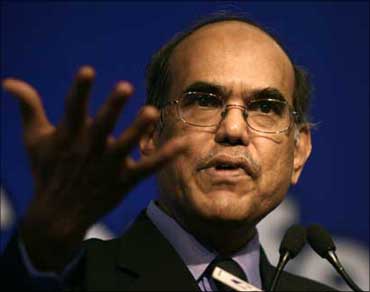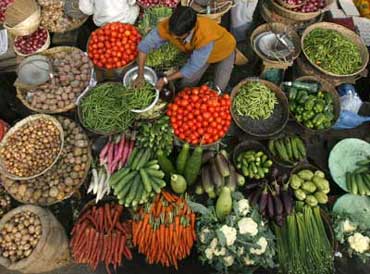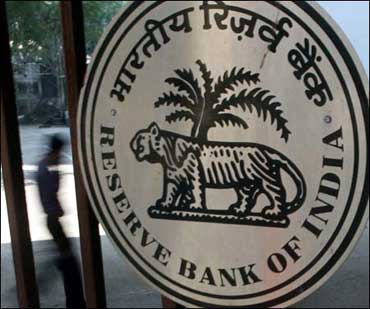Photographs: Reuters
The Reserve Bank of India is likely to raise policy rates by up to 25 basis points in its mid quarterly policy review on Thursday to tame inflation, which is still ruling near the double-digit mark, said experts.
Inflation, as per the revised index was 8.51 per cent in August, although it was 9.5 per cent according to the old index.
Even Finance Minister Pranab Mukherjee, while responding to decline in inflation, which under the new series fell by 1.3 percentage points during August, had said, "There is no room for complacency. We must continue to be vigilant and be prepared with the instruments of fiscal and monetary policy to use them as and when the need arises."
Citigroup said in its research report said, "Given the trends in both macro and sectoral data, coupled with the RBI saying that policy rates are still far from a normal position, we expect the RBI to raise both repo and reverse-repo rates by 25 bps in its review on September 16."
The government, on Tuesday, came out with a new wholesale price index series that measured inflation in August at 8.5 per cent based on 2004-05 prices.
. . .
Interest rates set to rise as RBI aims to curb inflation
Photographs: Reuters
Although the August figure is lower than that of July which was at 9.8 per cent, experts believe the supply and demand side pressures still remain and RBI should hike its short-term lending (repo) and borrowing (reverse-repo) rate to control money flow.
RBI Deputy Governor Subir Gokarn also expressed concern, saying, "The inflation rates that the economy is now experiencing, both from the supply and the demand sides, are clearly a matter of great concern. It is incumbent on the government and the central bank to use all the means at their disposal to rein inflation."
This is the first time that the Reserve Bank of India is coming out with a mid-quarter economic policy review.
. . .
Interest rates set to rise as RBI aims to curb inflation
Photographs: Reuters
"The RBI will go in for a rate hike as robust growth in industrial output and healthy economic growth would give the RBI enough cushion to make money expensive," Deloitte principal economist Shanto Ghosh said.
The RBI has raised interest rates four times this year, upping key policy rates by 100 basis points as it tries to combat high inflation in Asia's third-largest economy.
In its first quarter monetary review in July, the central bank had raised short-term lending and borrowing rates by 0.25 per cent and 0.50 per cent, respectively.
Following the increase, the repo rate stands at 5.75 per cent and the reverse repo rate at 4.50 per cent.
India's GDP grew by 8.8 per cent in the first quarter, against 6 per cent in the April-June period last fiscal.
Furthermore, industrial output expanded by 13.8 per cent in July from 7.2 per cent in the corresponding month last year.




article